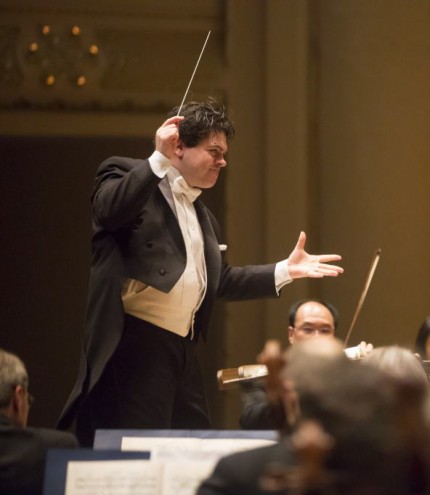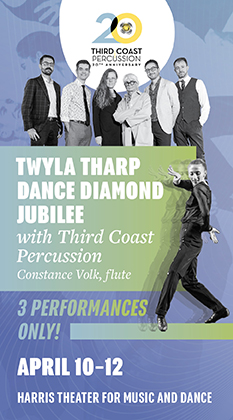Macelaru fills in again at CSO with largely successful results

One conductor’s ocular problem is another conductor’s opportunity.
One year ago, Cristian Macelaru filled in for Pierre Boulez when the French conductor had to bow out of his Stravinsky and Schoenberg program with the Chicago Symphony Orchestra on the advice of his ophthalmologist.
Thursday night, Macelaru was back, once again pinch-hitting for an ailing Boulez, whose medical reason for canceling this time was not specified. Stravinsky was again on the program along with Debussy and Bartok, a trifecta that virtually defines Boulez’s core repertoire.
The performances led by the young Romanian conductor Thursday may not have been the most individual interpretively—let alone offering Boulez’s brand of hyper-refined lucidity that can double as a free hearing test. Yet Macelaru drew largely worthy and compelling performances, aided by a bravura solo turn by Yefim Bronfman and some sensational playing by the orchestra with several notable contributions from the CSO’s first-chair players.
Mathieu Dufour virtually owns Debussy’s Prelude to the Afternoon of a Faun, and its striking how fresh the CSO principal flutist’s playing is every time out—Dufour seems to conjure up the essence of the hazy, evanescent languor naturally and effortlessly. Macelaru drew atmospheric playing from the orchestra, with equally evocative contributions by oboist Eugene Izotov and second flutist Jennifer Gunn.
Is it permissible yet to say that Bartok’s piano concertos are really not all that great? This is the spinach brand of 20th-century keyboard showpiece that’s supposed to be good for you because there are no tunes and the hard-edged scoring and astringent style make it less easily assimilable than Rachmaninoff.
That said, Yefim Bronfman played the hell out of Bartok’s Piano Concerto No. 2, making about as convincing a case as one will ever likely hear. The soloist brought daunting power and outsized technique to the spiky virtuoso sections, vaulting through the blinding passagework and coruscating octaves like child’s play. In the Adagio, Bronfman distilled an unearthly unsettled calm, sharply contrasted with the scherzo-like central episode, which was tossed off by the soloist with remarkable speed and fleet articulation.
Macelaru and the orchestra provided alert and boldly projected support not least in the angular brass fanfares of the final movement. Repeated ovations brought Bronfman back out for an encore of Chopin’s Etude in F major, Op. 10, no. 8, the evenly cascading flow of notes done with wonderful style, sly wit and finesse.
Macelaru’s one program change was to replace Chronochromie by Messiaen with Bartok’s Divertimento for strings. Initial disappointment at losing this week’s single rarity was immediately offset by the compelling and incisive performance elicited by Macelaru.
It’s always a dicey and somewhat patronizing proposition to attribute idiomatic sympathy to musicians in repertoire based on ethnicity or geography. Even so, the Romanian conductor did draw a world of expression in the Hungarian Bartok’s Divertimento with great relish and empathy. Macelaru seemed to find the harmonic bite of the Magyar folk rhythms firmly yet naturally, also underlining the lyrical elements neatly. The CSO strings were at their considerable finest, and concertmaster Robert Chen rendered superb solo work bringing pure tone and lively panache to his Budapest barnyard fiddling.
Stravinsky’s Song of the Nightingale closed the evening. Even with its elongated composition period, the tripartite symphonic poem for large orchestra is a sterling example of how Stravinsky’s kaleidoscopic scoring can transform base thematic material into gold with characteristic rhythmic and scoring audacity.
The work at times reaches back to Firebird in its coloring and style, though the later, more advanced Stravinsky is there as well. Macelaru’s extrovert approach at times made the piece sound more like The Rite of the Nightingale, somewhat slighting the perfumed and more nuanced Gallic qualities.
Yet he succeeded in bringing out Stravinsky’s remarkable range of hues and the ingenuity of the score, from the satiric chinoiserie to the fisherman’s lonely trumpet song. The CSO was at their very finest in this music, a concerto for orchestra in all but name, with several first-class contributions from trumpeter Christopher Martin, Dufour, Izotov and Chen.
——————–
It was good to have all of the CSO’s first-chair winds on stage at the same time, a too-infrequent occurrence. Less fortunate is that Stephen Williamson, who has performed superbly as principal clarinet, is following Mathieu Dufour’s brief flirtation with the L.A. Philharmonic, and taking a leave of absence after just two seasons with the CSO to go play with the New York Philharmonic. (“I love you honey, but I’m going to live with someone else now; maybe I’ll be back.”)
When the CSO hires their new principal horn—or indeed any future position—they should make it a contractual requirement that all future hires are going to commit to Chicago exclusively for a specified term. Important positions, especially principal jobs that have taken years to fill, are far too important to bestow on musicians who would rather play career games than take their Chicago commitment as seriously and professionally as the rest of their colleagues.
The program will be repeated 8 p.m. Saturday and 7:30 p.m. Tuesday. cso.org; 312-294-3000
Posted in Performances




Posted Mar 10, 2013 at 1:37 pm by Odradek
I went to the Saturday night concert and basically agree with you about the quality of the performance (missing a chance to hear the Messiaen was quite a disappointment though). I also like Bartok about 100 times more than Rachmaninoff, so I probably enjoyed it even more…